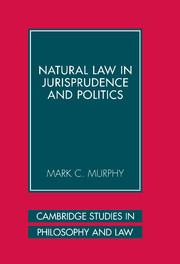Book contents
- Frontmatter
- Contents
- Acknowledgments
- Natural Law in Jurisprudence and Politics
- Introduction: Natural Law Jurisprudence and Natural Law Political Philosophy
- 1 Natural Law Jurisprudence Formulated
- 2 Natural Law Jurisprudence Defended
- 3 The Common Good
- 4 The Natural Law Rejection of Consent Theory
- 5 A Consent Theory of the Authority of Law
- 6 The Authority of Law and Legal Punishment
- 7 Beneath and Beyond the Common Good
- Works Cited
- Index
2 - Natural Law Jurisprudence Defended
Published online by Cambridge University Press: 10 March 2010
- Frontmatter
- Contents
- Acknowledgments
- Natural Law in Jurisprudence and Politics
- Introduction: Natural Law Jurisprudence and Natural Law Political Philosophy
- 1 Natural Law Jurisprudence Formulated
- 2 Natural Law Jurisprudence Defended
- 3 The Common Good
- 4 The Natural Law Rejection of Consent Theory
- 5 A Consent Theory of the Authority of Law
- 6 The Authority of Law and Legal Punishment
- 7 Beneath and Beyond the Common Good
- Works Cited
- Index
Summary
Three Routes to the Weak Natural Law Thesis
The strong natural law thesis holds that law unbacked by decisive reasons for compliance is no law at all. The weak natural law thesis holds that law unbacked by decisive reasons for compliance is defective precisely as law. I have two central aims in this chapter – first, to defend the truth of the weak natural law thesis; second, to show that the success of this defense of the weak natural law thesis is not merely a way station to the defense of the strong natural law thesis but provides the premises to call the strong natural law thesis into question. So while the standard criticisms of natural law jurisprudence (1.1) fall short of providing serious reasons to reject the strong natural law thesis, reasons to reject the strong thesis emerge in prosecuting the task of defending the natural law view.
I will consider three initially plausible routes to the weak natural law thesis. What makes each of these an initially plausible route to that thesis is that each exhibits on its face a technique for distinguishing between law's existence conditions and its non-defectiveness conditions, and provides some clue to identifying what law's non-defectiveness conditions are. One route, the ‘legal point of view’ route endorsed by Finnis, appeals to the notion that there is a distinctively legal point of view, and it is law as characterized from this point of view that is paradigmatically law (2.2).
- Type
- Chapter
- Information
- Natural Law in Jurisprudence and Politics , pp. 25 - 60Publisher: Cambridge University PressPrint publication year: 2006



